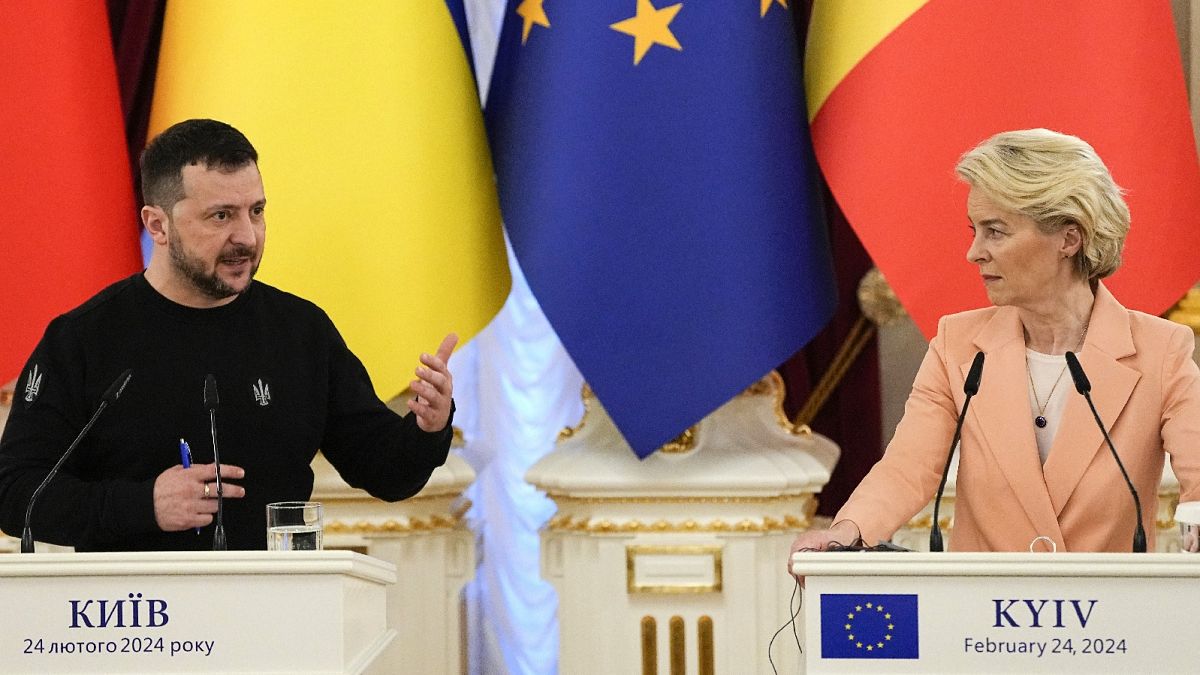Should the EU continue to support Ukraine? Our poll finds Europeans are in favour
Most of the respondents of an exclusive poll for Euronews by IPSOS say support to Ukraine should continue. But they are in two minds about whether it should be a priority for the next mandate. According to an exclusive IPSOS/Euronews poll, EU voters are rather hesitant to take a clear stance when it comes to […]


Most of the respondents of an exclusive poll for Euronews by IPSOS say support to Ukraine should continue. But they are in two minds about whether it should be a priority for the next mandate.
According to an exclusive IPSOS/Euronews poll, EU voters are rather hesitant to take a clear stance when it comes to the bloc’s aid to Ukraine.
The first-of-its-kind poll, which had nearly 26,000 respondents from 18 EU countries, reveals that 36% of Europeans want aid to Ukraine to be a priority of the next European parliament. Another 36% see it as important but not a priority while it is a secondary issue for the remaining 27% of respondents.
Views on assistance to the war-torn nation, however, differ wildly on a country-by-country basis.
Nuanced solidarity
Respondents from Nordic EU member states are the most vocal in calling on the next parliament to be more proactive in its support to Ukraine with 68% of Swedes, 59 % of Danes, and 57 % of Finns declaring it a priority for them.
But in Hungary, Greece, Romania and Slovakia, most respondents – 47%, 45%, 48% and 39% respectively – saw aid to Ukraine as a secondary issue. Only 12% of Hungarians believe aid to Ukraine should be an EU priority over the next mandate.
In Germany, Poland and the Czech Republic, where the governments are among the biggest donors of military assistance to Ukraine, respondents seem to be feeling some aid fatigue with the shares closely resembling the EU’s average.
Some of the discontent in Eastern Europe and in the member states bordering Ukraine is likely linked to the import of Ukrainian agricultural products, which European farmers have been protesting against arguing they are depressing prices across the bloc.
When delving into political ideology, supporters of the Greens (57%) overwhelmingly back making aid to support a priority for the next five years. Respondents identifying with the main three political groups in the European Parliament – the centre-right European People’s Party, the centre-left Socialists and Democrats and the centrist Renew groups – are also largely in favour of continued strong support to Ukraine.
Support from left-wing voters is more subdued but nonetheless largely positive. A majority of respondents who align themselves with the far-right Identity & Democracy group, however, view aid to Ukraine as secondary.
The poll however does not distinguish between the various types of aid. The EU has been providing military, macro-financial and humanitarian assistance to Ukraine since Russia launched its full-scale invasion more than two years ago.
Is the EU’s support actually helping Ukraine
Asked whether the EU’s stance on Ukraine had had a positive impact on developments in the embattled country, respondents across the 18 countries polled were just as equally split.
Thirty-six per cent say the EU has had a positive impact, 32% declare the bloc’s impact was neither positive nor negative, and the remaining 31% believe that the impact was negative.
According to figures published by the Council of the European Union, the total amount of aid provided to Ukraine by the 27 member states is more than €143 billion.
Of these, €81 billion was pledged through the EU budget in financial, economic and humanitarian support with a further €12 billion by the member states for the same purpose. Military assistance totals €33 billion — two-thirds as bilateral support and the remaining €11 billion under the European Peace Facility instrument — while €17 billion has been disbursed in support for refugees within the EU.
Over four million Ukrainian refugees have been sheltering in the EU since March 2022. Their protection and basic needs including health care, education for their children and housing are granted by the Temporary Protection System.
The EU has also taken a set of massive and unprecedented sanctions against Russia over its military aggression against Ukraine. Thirteen packages have been adopted to curb sales of Russian fossil fuels and metals and to severely limit its access to key goods and technologies it could use on the battlefield.
Additionally, over €300 billion from the Central Bank of Russia were immobilised across the EU and G7 allies.
Respondents from Nordic countries — 63% of Danes, 60% of Finns, 58% of Swedes — have a positive view about the impact the EU has had in supporting Ukraine. The Franco-German axis, meanwhile, is moderately satisfied: 37% of French respondents have a positive opinion and 31% a negative one, more or less the same as across the Rhine.
But In Romania, Slovakia, Italy, Austria, Greece and Hungary, most think that the EU’s impact on the war in Ukraine has been ineffective.














